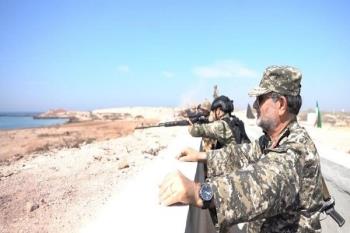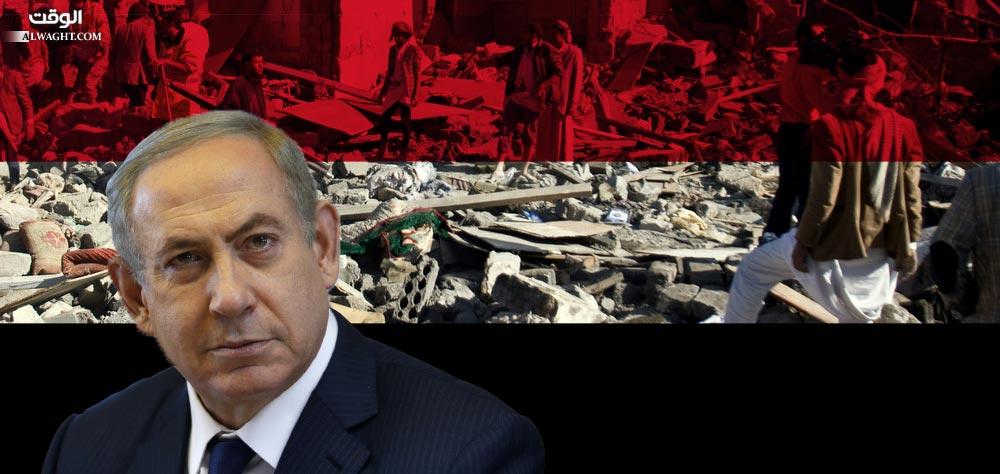Alwaght- Yemen’s political and military leaders argue that the Israeli regime is directly engaged in Saudi-led Arab coalitions' aggression on the impoverished nation, with the Israeli navy ships and boats having massive presence in the Red Sea and pounding targets inside Yemen along with the Saudi warships.
The 2011 popular Arab uprisings that ushered in the Islamic awakening period in Egypt, Tunisia, Libya, and Yemen were major events that transformed the power structures and brought about new security conditions to the West Asia and North Africa.
Key allies to Tel Aviv like the Egyptian dictator Hosni Mubarak collapsed in the new period, increasing the possibility of rise of revolutionary government mainly antipathetic to the Israeli occupation and advocate of the Palestinian rights. This was enough for the Israeli strategists to hear the alarm bells set off for the future Arab world developments. One of the sensitive Arab states for Tel Aviv is certainly Yemen.
Bab-el-Mandeb Strait control
Bab-el-Mandeb or Mandeb Strait is of great significance for the Israelis from a series of aspects. Assurance that the opponents will not dominate the significant waterway is vital to the Israeli military and security strategy. The Tel Aviv obsession with the Bab-el-Mandeb stems from on the one hand the strait's geographic position and on the other hand the dangers threatening the regime's security.
David Ben-Gurion, the founder of the Israeli regime and its first prime minister in 1949 talked about why the Israelis wanted to dominate the Red Sea. He said: “we are landlocked and sea is our only access way to the world and other continents.”
The Israeli regime identifies Syria and Lebanon as hostile parties, and the UN peacekeeping forces, dubbed the UNIFIL, are guarding the Israeli-Lebanese land borders as part of a deconfliction mission. It only has active border crossing with Jordan, but is devoid of the possibility to pass to other countries through the Jordanian territories as there is a ban on entry of Israeli goods and citizens to the Jordan neighbors.
The Israeli leaders have always been worried about Arab countries' domination of the waterways and possible imposition of restrictions on the Israeli sea access. In 1950, Egypt, in association with Saudi Arabia, managed to seize the Red Sea control militarily. In the same year, Egypt deployed forces to the mouth of the Gulf of Aqaba and the two islands of Sanafir and Tiran and so restricted the Israeli sea traffic. This was one of the key drives behind the Israeli war against Egypt in 1956. In 1973 Arab-Israeli war, the Yemeni army tightened the grip on the Bab-el-Mandeb. Tel Aviv is obsessed with assurance to keep the strait open as it is afraid that once a new war with the Arab states breaks out, the strait comes to a closure by the Yemenis in a bid to impose a sea and land blockade on Tel Aviv, though for decades big regional countries like Saudi Arabia and Egypt, influenced by the Western powers and media pressures and propaganda on the flimsy Iranian dangers, have forsaken support for the Palestinian cause and instead chose to shift to compromising attitudes, which mean at least in the present time Tel Aviv feels no dangers are posed to its marine access by Riyadh and Cairo.
The big share of the sea transportation in the Israeli economy is another reason for the Israeli leaders to put premium on the place of the strait in the global markets. A large portion of the Israeli trade is conducted through sea and the largest part of this portion is accomplished through the Red Sea and Bab-el-Mandeb. This describes the extent of vitality of the strait security for Israeli merchant vessels. Tel Aviv is also facing non-state challenges to its sea transportation as Bab-el-Mandeb waters are destabilized by sea piracy growing on the other coasts of the Red Sea in Djibouti and Somalia, and other Horn of Africa countries where pirates and terrorist groups hijack ships and release them for ransom.
These challenges embolden Tel Aviv steps to secure a sufficient degree of control over the strait, including setting up sea bases in the area. Close to the Bab-el-Mandeb Strait, the sea bases are equipped with control facilities to watch the sea traffic and oil tankers on the Saudi, Yemeni, Sudanese, and Somalian coasts. Tel Aviv provided financial aids to such Africa's coastal countries as Eritrea, Tanzania, and Kenya in return for stronger toehold there. Eritrea allowed the Israeli regime to build its military bases in the country’s Massawa port. Rawajiat and Mokhalawi are the two major Israeli bases on the coast of Eritrea and close to the Sudan border. Tel Aviv also rented Eritrean islands on the southern mouth of the Bab-el-Mandeb, including the Dahlak Archipelago on which the Israeli military established a base.
Moreover, the Israelis set up two air bases on the two islands of Haleb and Fatima also close to Bab-el-Mandeb Strait in efforts to secure its vessels' traffic. Yemen’s Perim island, seemingly under control of the Israelis, is used for merchant and military vessels' traffic watch. The presence in the island offers to the Israelis direct control over the strait and also the nearby Yemeni coasts from Mocha to the south of Bab-el-Mandeb.
In 1995, Yemen and Eritrea clashed over the Red Sea island of Greater Hanish. Yemen believed that the Israeli regime was also party to the war, helping the Eritrean forces by weapons supplying in return for the right to use military bases, something Tel Aviv officials rejected.
Paramount Israeli interests lie in the military supremacy over other regional states to enable its military actions. The 1981 Israeli air force airstrikes at the Iraqi nuclear facilities and then Libyan ones as well as measures to stop the Iranian nuclear program all are aimed at improving military superiority. But Yemen revolution brought back optimism about rise of a strong government clean from corruption and foreign-favored puppet politicians. If the revolutionaries manage to build a stronger and more stable Yemen on the strength of the abundance of manpower and natural resources, this means Tel Aviv loss of sway over Bab-el-Mandeb is inescapable.
Yemen's rich resources
Another reason for the Israeli attention to Yemen is this country’s wealth of natural resources that remain intact owing to the frequent wars and poor investment. Yemen’s hydrocarbons reserves are not limited to the oil-rich provinces, rather they stretch to the country’s territorial waters in the Indian Ocean and Red Sea where oil and gas in recent decades prompted prospecting operations by big oil companies in the region.
These attractions can substantiate the Yemeni officials' claims about the Israeli hands in the crisis and its unfoldment.



























